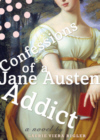Confessions of a Jane Austen Addict
The questions that follow are intended to enhance your group’s reading and discussion of CONFESSIONS OF A JANE AUSTEN ADDICT by Laurie Viera Rigler.
Questions
1. Would you have handled things differently if you found yourself in Courtney’s/Jane’s situation? Which things would you have done differently? Which things would you have done the same?
Had you witnessed my behaviour there, I can hardly suppose you would ever have thought well of me again.
Frank Churchill, in Jane Austen’s Emma2. How does Courtney/Jane use Jane Austen’s novels as a means of making sense of her world? Have you ever turned to your favorite books or films for inner strength, guidance, or comfort?
“Oh! it is only a novel!” replies the young lady; while she lays down her book with affected indifference, or momentary shame. It is… in short, only some work in which the greatest powers of the mind are displayed, in which the most thorough knowledge of human nature, the happiest delineation of its varieties, the liveliest effusions of wit and humour, are conveyed to the world in the best-chosen language.
Jane Austen, Northanger Abbey3. How do you interpret the ending of the book?
Let other pens dwell on guilt and misery. I quit such odious subjects as soon as I can, impatient to restore everybody, not greatly in fault themselves, to tolerable comfort, and to have done with all the rest.
Jane Austen, Mansfield Park4. Aside from the societal restrictions on a woman’s mobility, career choices, and living arrangements that Courtney/Jane faced in 1813, have parental, peer, and personal attitudes toward unmarried women fundamentally changed since Jane Austen’s day?
Ah! Jane, I take your place now, and you must go lower, because I am a married woman.
Lydia Bennet, in Jane Austen’s Pride and Prejudice5. One of the ways in which Courtney/Jane defines herself is by what she reads. To what extent do we define ourselves by what we read? To what extent do we form our opinions of others based on what they read?
The person, be it gentleman or lady, who has not pleasure in a good novel, must be intolerably stupid.
Henry Tilney, in Jane Austen’s Northanger Abbey6. Like Courtney/Jane, have you ever found yourself in a situation where your very concept of who you are was fundamentally challenged?
Till this moment, I never knew myself.
Elizabeth Bennet, in Jane Austen’s Pride and Prejudice.7. What are the things you think you would enjoy the most about being in Jane Austen’s world? What are the things you might find particularly challenging? Is there anything in the contemporary world that you absolutely could not do without?
One half of the world cannot understand the pleasures of the other.
Emma Woodhouse, in Jane Austen’s Emma8. If it were possible for you to be someone in Jane Austen’s world, who would you wish to be? Would you prefer a round trip ticket to that world, or a one-way only?
The distance is nothing, when one has a motive…
Elizabeth Bennet, in Jane Austen’s Pride and Prejudice

